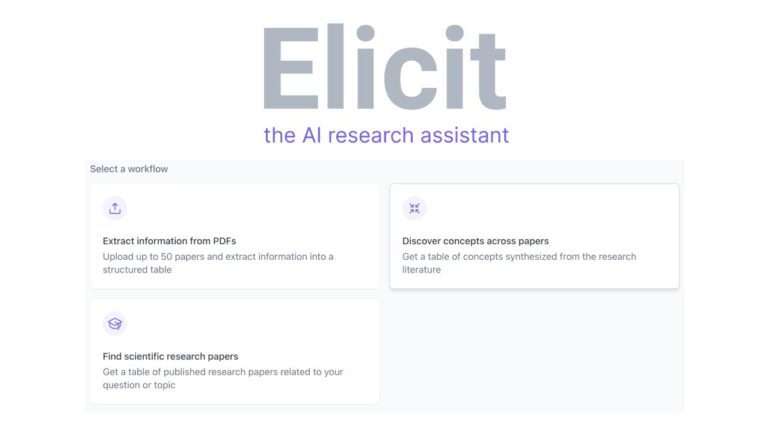TL;DR:
- Elicit, an AI startup, aims to transform the way researchers engage with scientific literature.
- Co-founder Andreas Stuhlmüller envisions Elicit as a “research assistant” that automates literature review tasks.
- Elicit utilizes language models to find and extract key information from research papers, simplifying the process.
- The platform assesses a paper’s trustworthiness and provides comprehensive answers, reducing the risk of misinformation.
- Elicit has gained traction with over 200,000 monthly users and secured $9 million in funding.
- The future includes introducing a paid tier, expanding the team, and positioning Elicit as an essential tool for research and reasoning.
- Open source initiatives are seen as complementary rather than competitive.
Main AI News:
In the fast-paced world of scientific research, time is of the essence. Researchers often find themselves buried in a sea of papers, spending hours searching for valuable information. According to recent surveys, scientists dedicate a significant portion of their workweek to information retrieval, and systematic literature reviews can consume almost a year for a small team. However, there’s a glimmer of hope on the horizon.
Enter Elicit, an AI-driven startup with a vision to revolutionize the way researchers engage with scientific literature. Andreas Stuhlmüller, one of the co-founders, alongside investors like Fifty Years, Basis Set, Illusion, and notable names such as Jeff Dean (Google’s chief scientist) and Thomas Ebeling (the former Novartis CEO), is spearheading the development of a cutting-edge “research assistant.”
Elicit’s Mission: Elevating Research Efficiency
Elicit’s mission is clear: to create a research assistant that empowers scientists and research and development labs. This revolutionary tool harnesses the power of language models to automate and streamline the laborious process of literature review. Andreas Stuhlmüller succinctly describes it as a platform that “automates literature review by finding relevant papers, extracting key information about the studies, and organizing the information into concepts.”
The genesis of Elicit can be traced back to Ought, a nonprofit research foundation founded by Stuhlmüller in 2017. Today, Elicit operates as a for-profit venture, with Jungwon Byun joining as co-founder in 2019. Their combined expertise has birthed a platform that leverages both first-party and third-party models to explore and extract concepts across a multitude of scientific papers.
Unlocking a Wealth of Knowledge
Elicit’s power lies in its ability to unlock a wealth of knowledge buried within the pages of scientific literature. Users can pose questions such as “What are all of the effects of creatine?” or “What are all of the datasets that have been used to study logical reasoning?” and receive comprehensive answers derived from academic sources.
But what sets Elicit apart from other language models in the market? While language models can sometimes generate inaccurate information, Stuhlmüller asserts that Elicit has gone the extra mile to ensure reliability. The platform dissects complex tasks into “human-understandable” components, allowing users to identify instances where models generate questionable content. Additionally, Elicit endeavors to evaluate a scientific paper’s overall “trustworthiness,” taking into account factors like research methodology and funding sources.
A Vision for the Future
Elicit isn’t just another chat interface; it’s a sophisticated tool designed for batch jobs. The platform always ties its generated answers back to the scientific literature, reducing the risk of misinformation and making it easy for users to validate the models’ outputs.
While some challenges persist in the realm of language models for scientific research, Elicit’s progress has garnered substantial interest within the research community. With over 200,000 monthly users, representing remarkable year-over-year growth, Elicit is already making waves in organizations such as The World Bank, Genentech, and Stanford.
Towards a Thriving Future for Scientific Research
With the recent injection of $9 million in funding led by Fifty Years, Elicit has ambitious plans to further develop its product and expand its team. Their strategy includes introducing a paid tier, catering to users who require advanced features, and ultimately positioning Elicit as an indispensable tool for research and reasoning in enterprises.
In a landscape where open source initiatives, like the Allen Institute for AI’s Open Language Model, aim to provide free-to-use large language models optimized for science, Stuhlmüller remains optimistic. He views open source efforts as complementary, with the primary competition being the labor-intensive nature of scientific research. As he aptly puts it, “This is where we’ll see entirely new AI-first workflows emerge.”
Conclusion:
Elicit’s innovative approach to automating scientific literature review has the potential to significantly impact the market. With a growing user base and substantial funding, Elicit’s expansion into paid tiers and enterprise-level adoption positions it as a disruptive force in the field of research and AI-driven workflows. Open source initiatives, while notable, are not seen as a direct threat, emphasizing the demand for more efficient research tools in academia and industry.

